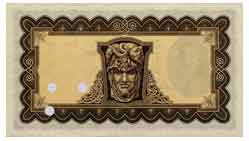
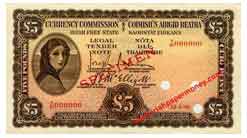
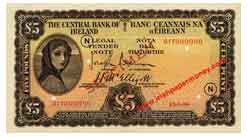
All denominations of the new Legal Tender Note series first entered circulation on their first date of issue, 10 September 1928. There were 700,000 Irish 5 pound notes dated 10.9.28, with a similar number dated 23.10.28.
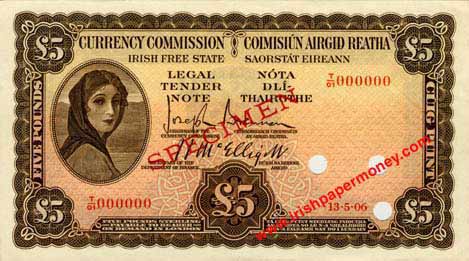
![]()
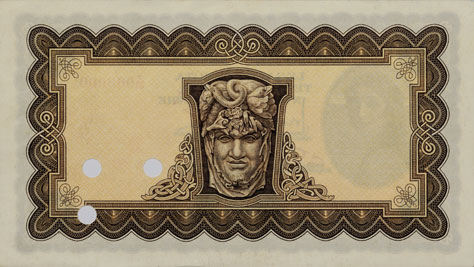
The Lavery 5 pound note was in use for 47 years, from 1928 to 1975. The later dates of the 5 pound notes are very common, with the final date 5.9.75 being readily available in uncirculated condition.
With the exception of notes dated in 1928 which had a large printage of 1.3 million over 2 dates and 13 prefixes [CBIAR], generally 100,000 Irish 5 pound notes were printed per prefix, with each prefix having a specific date of issue up until 1951. Irish 5 pound notes dated from 1952 had their serial numbers extended to 1,000,000 notes per prefix. Generally Irish 5 pound notes dated 1952 and later are far more common than earlier notes, especially in better grade.
Certain rarer dates were produced of Irish 5 pound notes which had much lower printages than normal. Some of these dates are very rare.
The highest price known to be paid for a Lavery 5 pound note in auction was £3,100 plus fees for a note dated 4.2.33 in Fine grade [noonans.co.uk, 12 February 2020, Lot 157]. This is the only recorded example of this rare date, and the only Lavery Irish 5 Pound note with a date in 1933.
The smaller version of the portrait of Lady Lavery was used on the Series A Irish 5 Pound note. The portrait is 44 mm high on the 5 Pounds, slightly taller than on the One Pound note.
Dimensions of the 5 pound Note are approximately 165 x 92 mm. This was measured on a note dated 10.9.28 and on a note dated 15.10.40. Dimensions on different notes can vary by a couple of millimetres.
Brown was chosen as the main ink colour for the new Irish 5 pound notes. This was printed on an underprint of yellow and orange ink.
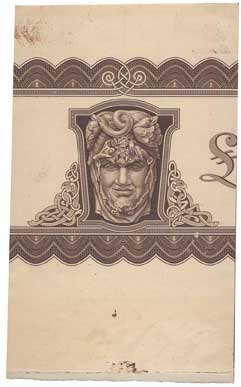
Partial proof of the reverse of a 5 pound note design including a '£5' printed in the right field which was not used on the final version [2. noonans.co.uk, 24 Feb 2022, ex-Lot 423]
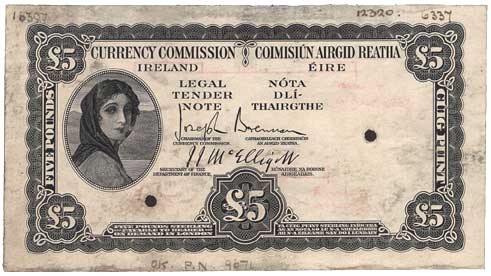
Obverse die proof in black ink of the 5 pound note for the 1938 Currency Commission Ireland design. [3. noonans.co.uk, 26 Aug 2021, Lot 272]
A 'River mask' taken from the facade of the Customs House in Dublin was selected for the centrepiece of the reverse of the banknote.
For the 5 Pounds the mask representing the River Lagan in Co. Down, which flows into Belfast Lough, was used [4. Moynihan 1975, p. 127].
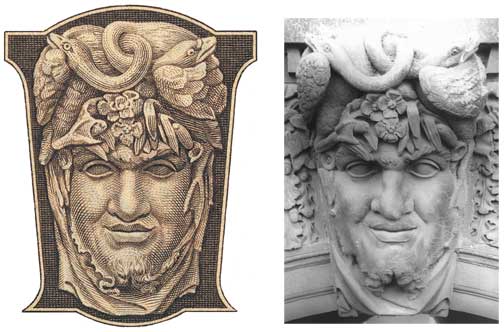
Left, the engraving of the Lagan river mask, taken from the original (right) located on the facade above one of the windows on the Customs House in Dublin. [4. Image at right ©Karl Whitney]
Irish 5 pound notes were issued under all of the design and signature variations for the Series A Legal Tender Notes up to 1975.
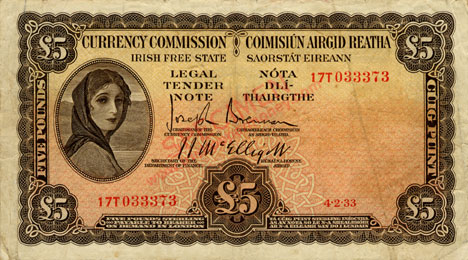
![]()

![]()
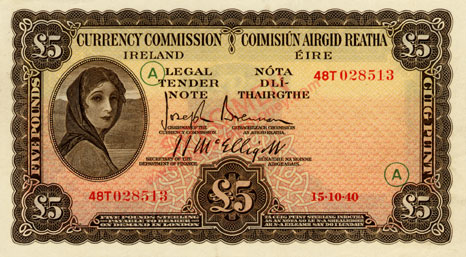
![]()
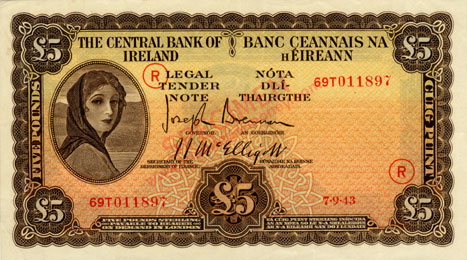
![]()
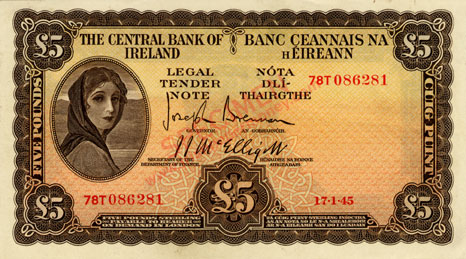
![]()
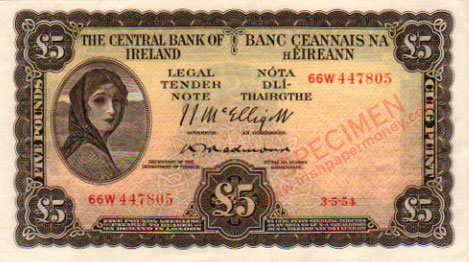
![]()

![]()
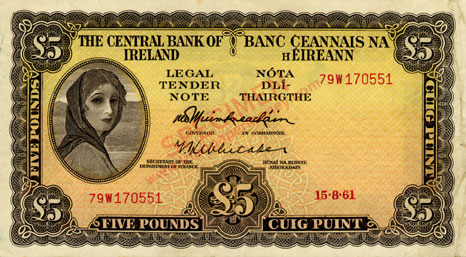
![]()
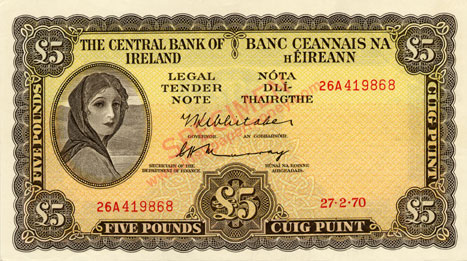
A major variation in design was the incorporation of a Special Identification Marking (SIM) 'War Code' into the design of the Irish 5 pound note during the World War 2 period. The War code is also sometimes referred to as an Emergency Tracer Overprint (ETO) code, although the code is not actually an overprint.
Irish 5 pound notes bearing the SIM war code were issued under both Issuing Authorities, Type 4 (1940-1942), and Type 5 (1943-1944).

Six war code combinations were used on the five pound note denomination.
Letters A, C, and D were used for Currency Commission Ireland five pound notes with dates in 1940, 1941 and 1942.
On the Central Bank of Ireland five pounds, letters N, R, and M were used with dates in 1943 and 1944.
The printing operations of 10 Shilling and £1 notes resulted in the displaced code variety, where for several dates the final date of a war code exists with the previous code. The variety does not occur on £5 notes as the notes were printed in single print runs using one code letter at a time [CBIAR]. However, two rare £5 note dates do result from the printing process, 2.5.41 code C, and 1.7.43 code N.
Bilingual text, in English on the left and in Irish on the right at the bottom of each note indicates the link at parity with Sterling.
'Five Pounds Sterling payable to bearer on demand in London'
'Tá Cúig Punt Sterling iníoctha as an nóta so le n-a shealbhóir ar n-a éilamh san do i Lundain'

1928–1960 Sterling Promise in the bottom panel of every Lady Lavery Irish 5 pound note
The sterling promise text was removed from the design on all Legal Tender Notes printed from 1961 onwards, to be replaced by the denomination in words. The first five pound note date with sterling promise replaced was 15.8.61.

1961–1975 Sterling promise replaced by the denomination in words, 'FIVE POUNDS' 'CÚIG PUINT'
All Irish Legal Tender Notes were printed on watermarked paper. The watermark consisted of the Head of Eirin on the bottom right of each note on all denominations, with additional watermarks in the centre of each denomination.
The centre watermarks can sometimes be difficult to see. On Irish Five Pound notes is the denomination of the note in the centre, £5, with the letters LTN above it, illustrated following.
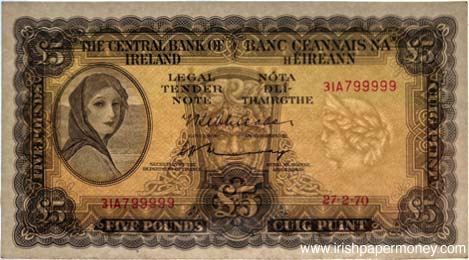
The watermarks can be seen on this backlit picture of a Lavery 5 Pound note, the letters 'LTN' above '£5' and the Head of Eirin on the right
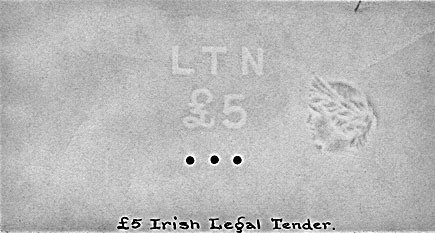
A section of a Portals Archive watermarked paper sample of the Irish 5 Pound Legal Tender Note [8. noonans.co.uk, 2023, ex-Lot 332]
Each denomination of the Series A banknotes incorporated several tiny security features in their designs on the face of every note. These features were in the form of little symbols and asymmetries in the design.
The four such security marks used on the Irish 5 Pound notes are illustrated following.
Plate Letters
In addition to the security marks on the Irish banknotes a tiny Plate Tracer (PT) code, or plate letter, was printed on the face and reverse of all 5 pound notes printed by Waterlow and Sons Ltd. These letters indicated the position of each banknote on the sheet of printed notes.
The PT codes ceased to be used on Irish banknotes when De La Rue took over the printing. The last such code letters appeared on Irish 5 pound notes dated in 1959. The location of the PT codes on Irish five pound notes is also illustrated below.
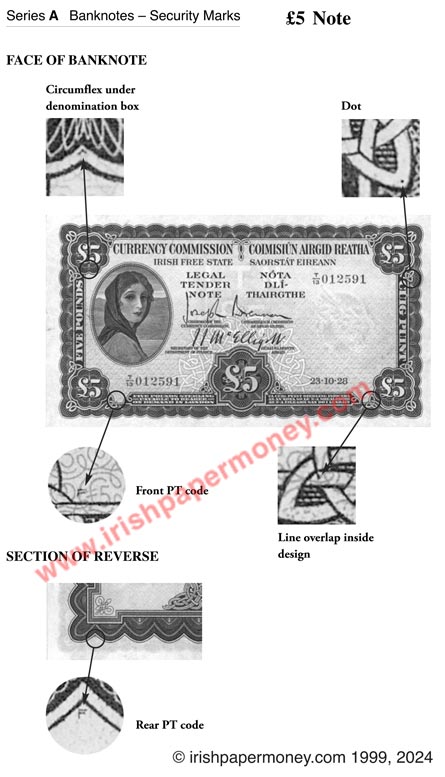
There are 193 dates for the Irish Five Pound note, from 10.9.28 to 5.9.75. The range of dates includes 4.2.33, the only Lavery five pound note with a date in 1933, and a very rare date by printage, with just one example recorded.
There are several rare dates by printage for the 5 Pound note: 4.2.33, 6.4.37, 2.5.41, 1.7.43, 24.4.51, 24.3.53. Several other dates are scarce and seldom offered.
One date remains to be recorded for Irish 5 pound notes, 15.9.55.

References
1. CBIAR. Central Bank of Ireland Archives. 'Statement of Accounts of the Currency Commission for the Period Ended 31st March 1929'.
2. Auction Catalogue, Noonan's (DNW), London. British and Irish Banknotes, 24. February 2022.
3. Auction Catalogue, Noonan's (DNW), London. British, Irish and World Banknotes, 26 Aug 2021.
4. Moynihan, Dr. M. 'Currency and Central Banking in Ireland 1922–1960', Gill & Macmillan and The Central Bank of Ireland, 1975.
5. Image ©Karl Whitney. Riverine keystone head at the Custom House, Dublin, rendered in Portland stone by Edward Smyth, portraying one of the rivers of Ireland - in this case, the Blackwater. (Identified by Harold Leask). https://source.southdublinlibraries.ie/handle/10599/5553/simple-search?filterquery=Custom+House&filtername=subject&filtertype=equals [Last accessed 31.10.23]
6. Auction Catalogue, Noonan's (DNW), London. British and Irish Banknotes, 12 Oct 2023.
1 Pound Ploughman
5 Pounds Ploughman
10 Pounds Ploughman
20 Pounds Ploughman
50 Pounds Ploughman
100 Pounds Ploughman
Irish Ten Shilling Notes
1 Pound Note Lady Lavery
5 Pounds Lady Lavery
10 Pounds Lady Lavery
20 Pounds Lady Lavery
50 Pounds Lady Lavery
100 Pounds Lady Lavery
1 Pound Note, Queen Medb
5 Pound Note, John Scotus Eriugena
10 Pound Note, Jonathan Swift
20 Pound Note, W. B. Yeats
50 Pound Note, Turlough O'Carolan
100 Pound Note, Grace O'Malley
5 Pound Note, Sister Catherine McAuley
10 Pound Note, James Joyce
20 Pound Note, Daniel O'Connell
50 Pound Note, Douglas Hyde
100 Pound Note, Charles Stewart Parnell
Northen Ireland Polymer notes
Bank of Ireland Polymer Notes
Danske Bank Polymer Notes
Ulster Bank Polymer Notes
Special Sections and Articles
The Transition of Irish Currency, Irish banknotes 1918–1928
The Partition of Irish Currency, Irish banknotes 1928–1930
Banknote Design Evolution 1824 to 1916
Irish Three Pound Notes
Contemporary Forgeries of Early Irish Banknotes, ca1800-1930
Limerick Soviet Notes
Irish World War 2 Banknote Issues
Low Number Irish Banknotes
Irish Joint Stock Banks of Note Issue from 1783
Irish Legal Tender Note Specimens
Ploughman Scan Survey (PSS)
![]() Page under active revision, last update 05.03.25
Page under active revision, last update 05.03.25
